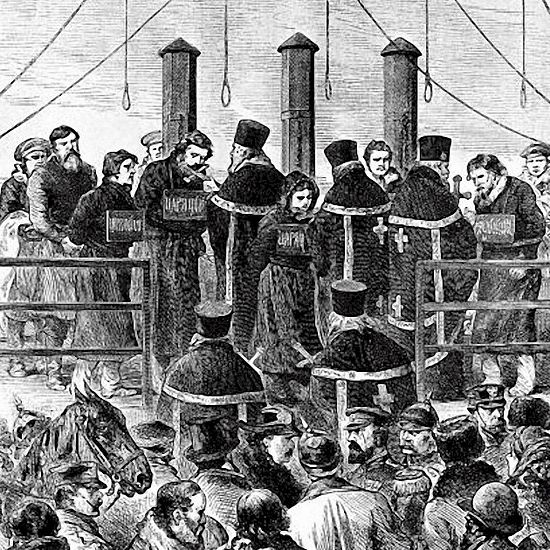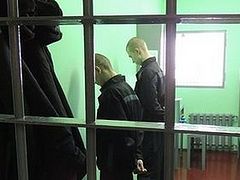Recently there has been a lot of heated debate about the death penalty in Russian society: whether or not it would be reasonable to lift the moratorium on capital punishment in connection with recent tragic events, namely the murder of an innocent nine-year-old girl in the city of Saratov.
We have talked with Archpriest Vladislav Tsypin, Ph.D in Church History, Ph.D in theology, Professor of the Moscow Theological Academy and the Sretensky Theological Seminary, about the position of the Church on capital punishment past and present.
—Fr. Vladislav, in your view, what historically was the Russian Orthodox Church’s perspective on the death penalty? Did it accept this form of punishment and never dispute it? Did it stand up for it being done away with, or did it have a neutral attitude towards it and never voice its position on it?
—If I were to choose from the answers you have suggested, I would say that the Church naturally accepted capital punishment as a reality, and it never disputed the legitimacy of its existence. At the same time, in the history of the early Church, Byzantium and the Russian Church the hierarchy often appealed in specific actions to the authorities for clemency for those sentenced to death. Thus, while not denying the need for the use of the death penalty, in different periods of its history the Church nevertheless stood for mercy toward those who committed grave crimes.
True, in some cases those who were obviously innocent were condemned to death; in such cases the Church in the person of its primates would appeal to the supreme authorities, to monarchs for the review of convictions. Perhaps the most distinctive example of intercession and mediation for those who were convicted unfairly was by Metropolitan Philip of Moscow.
Moreover, this kind of punishment is considered in “The Basics of the Social Concept of the Russian Orthodox Church”. This document pays considerable attention to this matter. The Church’s approach boils down to the following: While the Church does not have Biblical grounds for insisting on the abolition of the death penalty, it holds that if society has become mature enough to halt the use of capital punishment, then this initiative should be supported.
—Do I understand correctly that the Church has never raised its voice in favor of the abolition of capital punishment as such?
—You are right.
—But why?
—We will not take our days, when capital punishment has been removed from the penal codes of many countries. But in former times the legality of the use of the death penalty was apparent: Its purpose was to protect society from grave crimes.
From the dogmatic point of view it is also obvious that from a Christian perspective death is not the end of human life. Life continues after the physical death, and ultimate justice will not be revealed until the Last Judgment.
Therefore, even if a judicial error has taken place (which is, of course, very deplorable and terrible), it is still not a total tragedy. Those who were subjected to capital punishment while they were innocent will be rewarded for this in eternity somehow. Also, a criminal who is sentenced to death can also come to repentance provided that there is a time interval (even though a short one) between passing the sentence and its implementation.
Furthermore, a demand for the prohibition of the death penalty in any circumstances—for example, during hostilities—would mean a destructive approach to the functioning of the army and, therefore, the state. There would be an element of anarchism here—an idea that the Church can never accept.
—Is there perhaps excessive humaneness and sentimentality about the demands for the unconditional abolition of capital punishment?
—You may be right. It may be the very humanism that conflicts with the Christian understanding of man and society.
—And what exactly do they disagree on?
—They diverge in that earthly human life is considered to be an absolute value that surpasses all the rest, even the welfare of society. The fact that human life is everlasting is not taken into account. That is why capital punishment is seen as something far more tragic when we do not take into account the prospect of eternal life.
—You said earlier that the Church did not find any grounds for the abolition of capital punishment in the Bible. But some may contradict and say: What about the commandment “thou shalt not kill”, for instance?
—We see that many instances of capital punishment that are mentioned and described in the Old Testament are justified. And these are not only executions as a criminal measure; it is also the massacre of whole pagan nations that opposed the chosen people.
It also follows from the full context that the commandment, “thou shalt not kill” is about relationships between people. That is, it concerns instances when an individual takes another individual’s life.
But it is not a challenge to the very existence of the state and state power. Note what the Apostle Paul writes in his Epistle to the Romans: For he is the minister of God to thee for good. But if thou do that which is evil, be afraid; for he beareth not the sword in vain: for he is the minister of God, a revenger to execute wrath upon him that doeth evil (Rom. 13:4).
In truth the one in authority does not bear a sword as a decoration. Hence it ensues that the existence in the world (which lies in the power of the evil one) of those in authority who use capital punishment and command armies when they have to fight against the enemy is justified.
That is, the apostle Paul, who did not contradict the teaching of Christ and the Sermon on the Mount in any way, did not find any prohibition of the army, the judicial system, and punitive measures (up to the use of the sword for the execution of criminals) in the commandment “thou shalt not kill”.
—You have also said that society must become mature enough for the abolition of capital punishment. What does it mean? In your opinion, when does it happen?
—I think it happens when serious crimes become extremely rare in society. Then the imposition of milder sanctions will probably be sufficient. But in order not to apply any sanctions you need a state of society which is impossible to attain on earth. So any projects designed to abolish the state (and, therefore, the courts, the army, and so on) are absolutely utopian by nature. A society without the state is inconceivable; the state presupposes the presence and use of very physical forces and means of defense both from external threats and internal crimes.
—I wonder if you personally support the present moratorium on capital punishment in Russia under our current socio-cultural circumstances and in our crime-ridden situation.
—I would say that as a clergyman I have no right to speak up in favor of lifting the moratorium. However, if the majority of our country’s population is in favor of lifting it, I will not be against it.
—And why do you as a priest have no right to press for the lifting of the moratorium?
—On the one hand, we clergy bless soldiers to carry out their military duties, including participation in the killing of others. But, on the other hand, we cannot take up arms and take part in warfare ourselves. Consequently, it would be out of place for me as a priest to speak up for the return of the death penalty.





